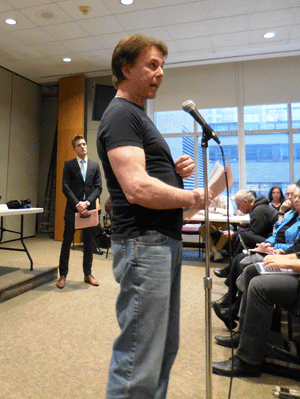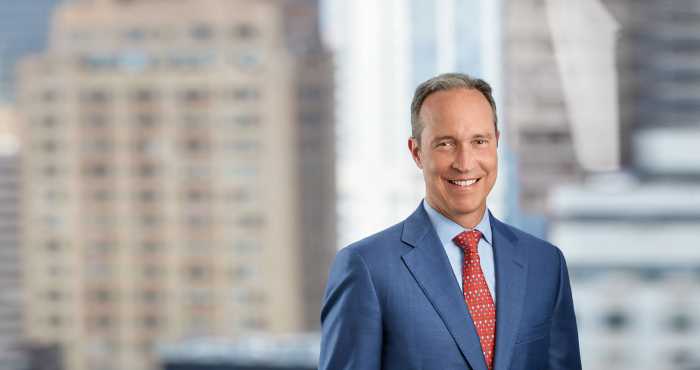
John Blair makes his case for Rise Bar, at CB4’s May 7 full board meeting.
BY EILEEN STUKANE | The public session of May 7’s full board meeting of Community Board 4 (CB4) ignited a burst of neighborhood activism in the many Hell’s Kitchen residents who came out to speak either for or against the liquor license application for Rise Bar at 859 Ninth Ave. (btw. W. 55th & 56th Sts.).
Annetta Marion, representing the co-op board of 855/857 Ninth Ave., was one of a number of speakers opposing Rise who said that a member of CB4 was involved with the bar, and a conflict of interest existed. Also, John Blair, one of the owners of Rise, has previously served as a CB4 member (for seven years). It suddenly seemed more than coincidental that CB4’s Conflict of Interest Rules and Procedures were being reviewed that night.
A conflict of interest, which comes up more often in areas of real estate (because members may be architects, real estate brokers, or developers themselves), requires a board member to recuse himself during a vote. However, a member can still attend and speak at a committee meeting.
The New York City Charter, Chapter 68, rules of conduct for Conflict of Interest among community board members, allows a member with a conflict to speak at a board’s committee meeting as long as he/she reveals the situation. As Christine Berthet, CB4 chair, explains, “At the beginning of a committee discussion, when an item of conflict comes up, a person is supposed to stand and say, ‘I have to recuse myself’ and explain his or her involvement so everybody knows that whatever they say they’re also involved, but they are still allowed to discuss the matter.”
Although it might seem that allowing someone with an investment in a restaurant to participate in the discussion of its liquor license could sway a vote, Berthet says that presumably after a committee hears that a person speaking has a conflict of interest, “They will make their own judgment on what the individual says on an issue. This is the rule in the New York City Charter, not just a CB4 rule.” She further explains that someone with a conflict “may have knowledge on an issue that is relevant to share, but again, other members will evaluate what is said in context.” It seems that as much as rules may be black and white, shading is gray.
During the full board’s voting session for Business Licenses and Permits, CB4 member Morgan McLean said that he had accepted the job of Rise manager. He recused himself from voting on the liquor license application from Rise. However Chelsea Now learned that he did not yet have the job when he participated in the Business License and Permits (BLP) Committee’s discussion of the liquor license application for Rise, when the owners had met with the committee. It was only after that committee meeting that McLean was offered employment.
According to the rules, there is no restriction on board members serving on committees even when those committees are addressing matters of their private interests or employers — but the members are required to “disclose, discuss and recuse” themselves.
CB4 is strengthening the city’s Conflict of Interest rules by asking each board member to sign a disclosure form which states that the rules have been read and requires members to list interests that may have potential conflict with CB4.“This is much stronger than what is done in the rest of the city,” says Berthet.
Twenty-two people took to the microphone with voices raised against the establishment of Rise. They spoke of the oversaturation of bars in the neighborhood, the wish to have the bar close at 2 am rather than the requested 4 am on Thurs., Fri. and Sat., the issue of noise and inappropriate street activity in the wee hours, and possible CB4 member conflict of interest. Patrick MacMurray begged the board not to allow another 4 am bar closing. “If I want to go to a gay bar, I don’t have to go to the new one across the street. I can go to any one in the neighborhood,” he said.
Seventeen people, Hell’s Kitchen residents — some former employees of Blair and at least one nightlife promoter — spoke in support of Rise. Blair himself, who had been involved in the flashy XL Nightclub on W. 42nd St., said he was planning to spend $70,000 on soundproofing for what he called a “first-class lounge” with a capacity of 73 people.
Board members initially discussed a recommendation to the New York State Liquor Authority (SLA) to deny the license because Blair, who as a compromise to the community had agreed to closing at 2 am on Sun. through Wed., would not budge on a 4 am closing from Thurs. through Sat. A motion to deny the license with information to the SLA that the denial was based on the fact that the owners would not agree to 2 am on weekends did not pass. No community concerns were discussed. Board members in favor of allowing a 4 am closing spoke out for New York City nightlife, and in support of Blair as a good business operator. Finally the motion passed 21 to 12 to recommend a 2 am closing Sun. through Wed. and 4 am Thurs. through Sat.
Although the SLA’s 500-foot rule would apply — if three bars are in operation within 500-feet then a fourth one would have to prove it is in the interest of the community to exist — in Hell’s Kitchen this rule has been fairly ignored. Many bars survive side by side. Since the vote was in favor of late hours, CB4 was acknowledging its recognition of the bar, not claiming oversaturation. At the SLA, however, there will be a hearing on the 500-foot rule for Rise and the community can bring its concerns there. Conflict of interest, however, will not be the argument to use.




































